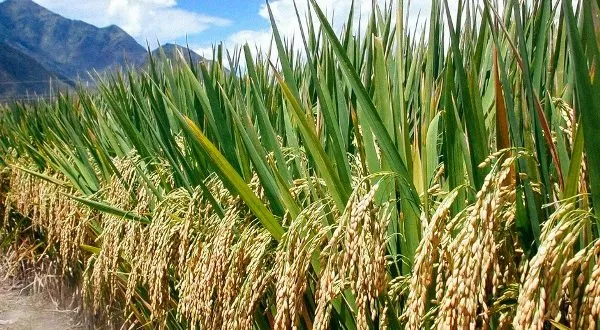Ghana’s appetite for rice has grown five times larger in just four decades, yet domestic production hasn’t kept pace. Today, the Institute for Fiscal Studies will tackle this widening gap with stakeholders in Accra.
The research, titled “Increasing Importation of Rice in Ghana: Can the Country Transform Its Fortunes in the Rice Sector?” seeks to unravel the persistent disconnect between what Ghana grows and what Ghanaians eat. It’s a question that carries significant weight for the country’s foreign exchange reserves and food security strategy.
Numbers from the Ministry of Food and Agriculture paint a striking picture. In 1980, the average Ghanaian consumed 12.4 kilograms of rice annually. By 2000, that figure had barely budged to 14.5 kilograms. Then something shifted. Consumption accelerated dramatically through the 2000s, reaching 32 kilograms per person by 2010. By the end of 2022, it had nearly doubled again to 61.05 kilograms.
That trajectory has created a supply crisis that government strategies have repeatedly failed to solve. Despite years of interventions aimed at boosting domestic production, rice imports continue climbing. Recent data suggests the situation has become more pressing, with some analysts describing import levels as alarming.
The think tank’s study examines why previous government efforts haven’t stemmed the tide. What specific strategies were tried? How did imports respond to those interventions? And perhaps most critically, what factors continue limiting Ghana’s rice sector performance despite repeated attempts at transformation?
Today’s stakeholder engagement will bring together government officials, rice farmers, agricultural associations, research institutions, and industry chambers. It’s not just another academic presentation, though. The Institute for Fiscal Studies hopes to spark concrete action rather than simply document problems everyone already recognizes.
Rice importation has become more than an agricultural issue. It affects Ghana’s balance of payments, putting pressure on the cedi’s exchange rate. It raises questions about food security in a nation blessed with arable land and favorable growing conditions. And it represents a significant drain on foreign currency that could potentially be redirected toward other development priorities.
The government has tried various approaches over the years. Some focused on subsidizing inputs to make local production more competitive. Others emphasized improving irrigation infrastructure or providing better access to markets. Yet imports keep growing, suggesting these interventions either weren’t sustained long enough or failed to address fundamental constraints.
What makes rice particularly challenging is the cultural shift in consumption patterns. Rice has evolved from an occasional meal to a daily staple for many Ghanaian households. Urban populations especially have embraced it for convenience and versatility. That demand isn’t likely to reverse, which means solutions must focus on production rather than trying to change eating habits.
The institute’s findings could reveal uncomfortable truths about why domestic rice struggles to compete with imports. Price differentials matter, certainly. But quality perceptions, processing standards, and consistency of supply all play roles in consumer preferences. Many Ghanaians will pay more for imported rice if they believe it’s superior quality.
Recent global developments have added urgency to the conversation. Ghana expects to import 950,000 tonnes of rice in the 2024/25 marketing year, representing a 20% increase as the country faces production challenges. Climate variability has affected yields in multiple regions, making self-sufficiency seem even more distant.
The agricultural sector’s broader struggles mirror the rice dilemma. Ghana spent an estimated GH₵38.95 billion on food imports in 2024, reflecting how deeply the country relies on foreign markets to feed itself. That dependency creates vulnerability to global price shocks and supply disruptions.
Some experts argue that Ghana’s approach to agriculture emphasizes low-value primary production without sufficient value addition. Processing facilities remain limited, storage infrastructure needs improvement, and farmer support systems often fall short of what’s needed for competitive productivity.
The institute’s research asks whether Ghana can actually transform its fortunes in rice production. That’s not rhetorical optimism, it’s a genuine question demanding evidence-based answers. Can the factors limiting performance be addressed effectively? Do political will and resources exist to implement solutions that previous governments abandoned halfway?
Today’s presentation will need to move beyond describing problems toward identifying specific, actionable interventions. Stakeholders have heard numerous diagnoses of what’s wrong with Ghana’s rice sector. What they need now are practical pathways toward meaningful change.
The broader agricultural economy depends partly on getting rice right. If Ghana can’t achieve reasonable self-sufficiency in a crop that grows well in tropical conditions and has proven global production models, what does that say about prospects for other commodities?
Recent government actions, including a temporary export ban on grains imposed in August 2024, demonstrate awareness of the crisis. But awareness alone doesn’t create transformation. Implementation, sustained funding, and coordinated effort across multiple agencies will determine whether Ghana’s rice fortunes can actually change.
The Institute for Fiscal Studies brings credibility to this conversation. Established in 2013 as a politically independent think tank, it has built a reputation for rigorous economic policy analysis. When IFS presents findings, policymakers typically pay attention.
Whether that attention translates into effective action remains the central question. Ghana has studies, strategies, and stated commitments regarding agricultural transformation. What it lacks is consistent follow-through and the willingness to make difficult resource allocation decisions that favor long-term food security over short-term political calculations.
Today’s stakeholder engagement could mark a turning point, or it could become another well-intentioned presentation filed away and forgotten. The difference will depend on whether participants leave with clear commitments and accountability mechanisms, not just good intentions.
For ordinary Ghanaians watching their food bills climb while local farmers struggle, the stakes couldn’t be higher. They need their government and agricultural sector to finally bridge the gap between rice consumption and rice production. The Institute for Fiscal Studies is attempting to show them how.
Source: newsghana.com.gh











